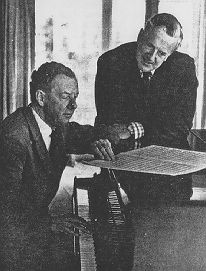Peter Pears
Life
|
Sir Peter Pears was born in Farnham, in 1910. He was a famous tenor and organist, and studied at the Royal College of Music. Many of Britten's works have parts specifically written for Pears, including Peter Grimes. Pears was the co-librettist for A Midsummer Night's Dream. He was knighted in 1978, and died in Aldeburgh in 1986.
Britten first met Pears in 1934, when Pears was a member of the BBC Singers.
They did not become strong friends until a friend of Pears, Peter Burra, died
in an air crash. Britten and Pears gave their first recital together in 1937,
at Balliol College, Oxford. The concert was part of a Spanish Civil War
relief program. As mentioned in the biography page, Britten traveled with
Pears to America. Their return home was marked by a performance of the
Michelangelo Sonnets at Wigmore Hall. Its success led
EMI to record it, which marked Pears and
Britten's first recording together.
|

Britten and Pears
|
What Pears knew about Britten
The following information about Britten is adapted from the "Peter Pears"
section of Alan Blyth's
Remembering Britten.
Britten and Pears played very well together during recitals (Britten played
the piano). Britten often got nervous before performances, especially during
his later years. He would tend to "freeze" up, which he thought impaired his
performance, but once he got into the performance he would lose this fear.
Britten was an accomplished conductor; he worked well with the English Chamber
Orchestra. This was partially due to his belief in efficient rehearsals. He
required the musicians to pay attention, and would be somewhat harsh if someone
was inattentive. This helped him focus on the music more.
He understood that there existed other interpretations of his works, but
often disliked second performances, especially when they weren't faithful
to his original intentions. One good example of this was Tony Guthrie's
production of Peter Grimes that had sea covering three-fourths
of the stage; this caused the performers to be crowded into a small area.
Britten wrote pieces for specific people (e.g. Pears) and so the singer's
personality was especially important. He would cast the singers before
actually writing the piece.
What Britten thought of other composers:
- Brahms:
In his younger days, Britten liked Brahms, but then reacted against his music.
- Beethoven: Ambivalent, but respectful.
- Mozart,
Schubert: "loved without qualification."
- Bach, Dowland, Purcell: Britten "liked" them.
- Mahler: Britten learned to appreciate Mahler after hearing his Fifth Symphony. He went to a concert to hear a "fashionable" concerto, expecting to be bored by the preceding Mahler symphony, but it turned out to be the other way around.
- Tchaikovsky, Debussy, Ravel: Britten liked them, especially for their skill in orchestration.
- Stravinsky: Britten liked his early works, but didn't like the Paris "chic air" that was associated with his later works.
- Shostakovich: Britten was friends with him, and loved his works.
Britten tried to compose every day; if he did not compose, he felt bad.
His daily life was very simple. According to Pears, "he could make a cup
of tea, boil an egg, and wash up, but not much more..." Britten took cold
baths, ate plain food, and observed an early bedtime. Below is his usual
daily schedule:
- 8:30 or 9:00
| Start composing |
- 1:15
| Eat lunch |
- After lunch to 5:00
| Take a long walk, think over composition |
- 5:00
| Resume composing |
- 8:00
| Eat dinner |
- Evening
| Try out his new composition on the piano, or discuss the music with Pears |
Britten was generally religious, in that he acknowledged the existence of a
higher power, but he was not a regular churchgoer. However, he did have a
"low church" puritanical attitude. He had a strong conscience, sense of
honor, and standards. He did not easily forgive people who violated his
moral standards.
"I think the key to his music lies in his moral point of view combined with his craving for lost innocence brought on by his increasing disillusionment with man"
- Peter Pears
